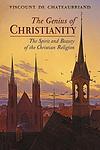François-Auguste-René de Chateaubriand
François-Auguste-René de Chateaubriand was a French writer, politician, diplomat, and historian who is considered the founder of Romanticism in French literature. Born on September 4, 1768, and passing away on July 4, 1848, he authored several influential works, including 'Atala' (1801), 'René' (1802), and 'The Genius of Christianity' (1802). His memoirs, 'Mémoires d'outre-tombe' ('Memoirs from Beyond the Tomb'), written at the end of his life and published posthumously, are often regarded as his masterpiece.
Books
This list of books are ONLY the books that have been ranked on the lists that are aggregated on this site. This is not a comprehensive list of all books by this author.
-
1. Memoirs From Beyond the Grave
"Memoirs From Beyond the Grave" is an autobiographical work that chronicles the author's life and experiences in the late 18th and early 19th century. It provides a detailed account of his personal life, his political career, his travels, and his encounters with significant historical figures of the time. The book is also a reflection of the author's thoughts on religion, philosophy, and literature, offering a profound insight into the social and political changes that occurred during the French Revolution and the Napoleonic era.
-
2. René
"René" is a seminal work of French Romantic literature that delves into the emotional turmoil and philosophical reflections of its eponymous protagonist, a young, disenchanted aristocrat. The novella explores themes of nature, solitude, and existential despair as René grapples with a profound sense of melancholy and a feeling of being out of step with society. His internal struggles and search for meaning lead him to the American wilderness, where encounters with indigenous peoples and the untamed landscape prompt deeper introspection. The narrative is a poignant examination of the individual's quest for authenticity and the pervasive sense of alienation that can accompany a sensitive and introspective soul in a world that seems indifferent to its deeper yearnings.
-
3. Atala
"Atala" is a romantic novella set in the wilderness of the American South, blending the natural landscape with the tragic love story of its protagonists. The narrative follows Chactas, a Native American man, who recounts his youthful love affair with Atala, a half-European, half-Native American woman. Their love is challenged by cultural differences and Atala's vow of chastity, which she made to her mother. The story is imbued with themes of passion, religion, and the noble savage, and it reflects on the conflict between duty and desire. Ultimately, the novella is a poignant exploration of forbidden love and the sacrifices made in its name, set against the backdrop of a disappearing natural world and the encroachment of European civilization.
-
4. The Genius Of Christianity
The book is a comprehensive defense and celebration of the Christian faith, arguing that Christianity is not only a source of moral and spiritual guidance but also a driving force for cultural and artistic excellence. The author presents Christianity as the foundation of Western civilization, attributing to it the genius behind its laws, customs, and institutions. He explores the religion's influence on literature, fine arts, and societal values, suggesting that the beauty and sublimity found in Christian doctrine, rituals, and symbolism have profoundly shaped human creativity and sentiment. The work serves as both an apologetic treatise and a romantic homage to the aesthetic and cultural contributions of Christianity throughout history.



